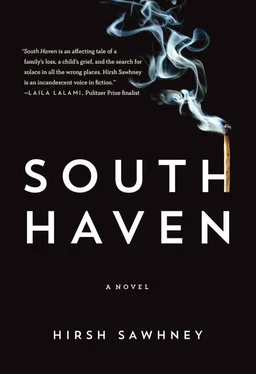Eventually, Arjun rested the paperback on his chest. “What’s up?”
“Why are you reading that ?”
“What do you mean?”
“I mean, you’re American. Why don’t you read about America?”
“Jesus,” said Arjun, “I gotta get you out of here.”
Siddharth lay down, leaning his back against the wall. He placed his left leg across his brother’s waist. Arjun was staring at something, and Siddharth followed his gaze to the far corner of the room, to the family portrait above a dingy love seat. The picture was held in an intricately carved Indian frame. He must have been around four, and he was wearing a red sweater that had been a birthday gift.
Arjun rested his wrists on Siddharth’s leg. “I can remember the day it was taken,” he said. “Mom had one of her migraines. I think she even puked.”
“So why did we go then?”
“Go where?” asked Arjun.
“To get the picture taken. Why did we go if she was sick?”
“She probably didn’t want to piss off Dad. Everybody lived in perpetual fear of pissing him off — everybody except for you.”
Arjun got up and went to the bathroom, and Siddharth lay there thinking about their mother. Arjun had so many memories of her, which was good, but also a reminder of all that Siddharth would never know. He looked around the guest room and noticed how cluttered it had gotten. Discarded luggage and old furniture lined every wall, and the dressing table was crammed with all kinds of knickknacks. He spotted the brass fisherman they had bought on a family trip to Maine. When you wound him up, he started to spin, and a little music box played “Moon River.” Mohan Lal had invented his own nonsensical Hindi lyrics to go along with the tune. Siddharth couldn’t imagine him doing something like that anymore.
He started thumbing through the pages of Arjun’s book, and a photo fell out. He grasped it by the edges, just as his mother had taught him. The picture was of a girl, about nineteen or twenty years old. She was standing in a room with white marble floors, bending forward and blowing a kiss. She was trying to look glamorous but was clearly also kidding around. Siddharth’s breathing quickened. He had suspected that Arjun had a secret love life for some time now. A few months earlier, he had phoned his brother’s room, and Arjun’s roommate answered. The roommate said that Arjun was out with his girlfriend. When Siddharth later followed up with his brother, Arjun said that his roommate was crazy, then quickly changed the subject to college basketball.
Now he knew why Arjun had been so sketchy. The girl in the photo — his girlfriend — had hips that were too wide. Her hair was floppy and short, and a portion of her bangs were painted pink. But none of that was a big deal. The real problem was that she had a nose ring. The real problem was that she had brown skin. The real problem was that Arjun’s girlfriend was Indian.
Hearing a noise, Siddharth placed the photo back inside the book and quickly closed it.
Arjun walked in and gave him a curious look. “What are you up to?”
“What does it look like?”
“I dunno, but I can tell you’re up to something.”
Siddharth needed to change the subject. “So?”
“So what?”
“So what do you think of her?”
Arjun reached his arms up to the ceiling and then bent down to touch his toes. “You mean Ms. Farber?” He took a few deep breaths while his fingers hovered over the blue carpet, then stood upright again. “To be honest, I like her. She’s a little naive — a little conservative. But who isn’t around here? And she’s attractive — for her age, I mean. And ambitious. Dad needs that. I just hope he doesn’t fuck it up.”
4. The Conditioning of White Girls
Ms. Farber cooked everyone breakfast the next morning, and then Arjun drove Siddharth to the Blue Trail in Woodford, where they hiked to some waterfalls. Despite the savage mosquitoes and his itchy eyes, he was happy to have his brother all to himself. He wished he could ask Arjun about his Indian girlfriend, or tell him about the freakish parts of Ms. Farber’s personality, but he knew that this was all sensitive terrain. He knew that like Mohan Lal, Arjun could be explosive.
Later, as they were driving to Post Road to do some shopping, he told Arjun how much Barry Uncle had been around lately. Arjun told him that Barry Uncle was tasteless and uncouth — that it was inappropriate of him to try to convince Mohan Lal to sue the truck driver who had rear-ended their mother. As Siddharth listened to his brother talk about their mother’s death, he again felt claustrophobic. Arjun spoke about her so openly — so calmly — as if he were referring to some random thing that had happened to a stranger, as if he were recapping highlights from the evening news. How could he be so cold? Didn’t he care about them?
“I don’t get it,” Siddharth said. “I thought you’d be happy about Dad and Barry Uncle. I thought you were the one who didn’t want Dad to be isolated.”
“Look,” Arjun replied, “I don’t really care about any of that lawsuit garbage. But I do think Barry’s an imbecile. He’s an idiot. He’s even more simplistic than Dad.”
“Dad’s not simplistic.”
“They’re both freaking simplistic — simplistic fascists.”
He hated hearing his brother use such cruel words about their father. But they only had a few days together, and he didn’t want to waste a second fighting. He needed to change the subject, so he told Arjun that he was anxious about starting junior high. “I’m worried about all the homework. What if I don’t make any friends?”
Arjun told him to relax. Seventh grade was a big step, but junior high school students were more mature. “I know you have your thing against sports,” he said, “but if I were you, I would definitely run track. The track kids are cool, but they’re also smart. And you should definitely run for student council. It’s a good way to get noticed. And remember, the coolest kids are the ones with the best sense of humor. Make sure you laugh at other people’s jokes.”
Soon they were at the mall, and they headed to a shoe store. After Arjun tried on a couple pairs of running sneakers, he picked out some suede bucks for Siddharth’s first day of school.
“I’m not sure,” said Siddharth.
“Trust me,” said Arjun. “They’re cool.”
On their way home, they passed through the center of town, skirting the annual South Haven County Fair, where their mother had won ribbons for her paintings. From the car, Siddharth was able to catch a glimpse of the fair’s antique auto show, with ancient plows and tractors.
Arjun sneered. “This place is really so freaking hickish.”
Siddharth frowned. “It’s not that bad.”
“Trust me — it is.”
“Okay, so where would you rather live?”
“A million places. London. Bombay. New York.”
“Bombay?” He gritted his teeth. “That’ll be perfect. My big brother’s gonna live in India with his Indian girlfriend.”
Arjun slowed the car. “What was that?”
“Nothing.” Siddharth realized he’d made a mistake.
“Don’t be a child. Tell me what you said.”
“Honestly, I was just joking around.”
“No you weren’t. Siddharth, we’re gonna have a problem if you don’t start talking.”
They paused at a stop sign, and he sighed. “I saw a picture of your girlfriend.”
“Which picture?”
“The one in your book.”
Arjun glared at him, then proceeded across Route 114. “You’re still snooping through my stuff. What are you, five?”
“I wasn’t snooping. . It just fell out.”
Читать дальше












